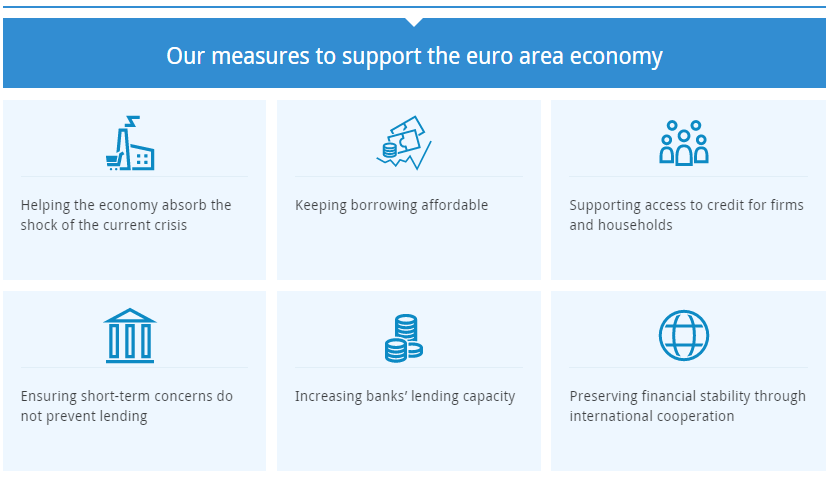At the start of their coronavirus lockdowns, European governments scrambled to shore up businesses and the public sector with subsidies in a bid to ensure that a post-virus recession is not that prolonged because of a resulting cascade of layoffs and bankruptcies. As the COVID-19 health crisis appears to be slowly passing its most critical phase, European leaders and finance ministers are increasingly focused on questions of how to pay for the crisis to restart the economies of the Eurozone and of the European Union once the storm has passed.
Failure to make progress on a more collective, bolder vision for European economic recovery could undermine the internal and external credibility of the EU and support from its member states and citizens. EU countries already appear to be recovering at different speeds from the crisis. But the EU’s single market only works if all countries are able to both buy and sell goods and services across borders. If less well-off countries are left to suffer their own economic fates, richer economies will not be insulated from the consequences, as they would see a contraction in the demand for their exports. Further, internal fragmentation could weaken EU negotiating power with other countries, and worryingly, the countries that have been most hard-hit may find their internal allegiances weakened, and could turn to third countries, like China, to pursue desperately needed economic opportunities and foreign direct investments to help restart their economic engines.
Europe’s response to the COVID-19 crisis will involve the immediate costs of human life, health, and economic activity. But it will also involve political costs, pitting the collective and domestic credibility of its response against populist and nationalist forces seeking to capitalize on the opportunity to demonstrate that EU solidarity is far less than what was believed. Currently these forces are seeking to amplify the divide between EU member states, in part by highlighting long-standing fissures through accusation and the dissemination of partisan information.
Europe’s future success will be determined by whether it assures economic prosperity across Europe, allowing the benefits of EU and euro membership to easily outweigh the costs. Europe always seems to find temporary solutions to crises, but this crisis presents Europe with a particularly stark set of choices about its future direction. If European leaders can find a collective means to agree on a long-term and comprehensive approach to helping all member states emerge stronger from this crisis, Europe will thrive. If not, the idea of “Europe” will continue to decline in the eyes of individual Europeans, with or without the involvement of nationalists or populists at all.

Alternative scenarios for the impact of the COVID-19 pandemic on economic activity in the euro area
These illustrative scenarios abstract from a number of other relevant factors that would also influence the magnitude of the recession in the euro area. The scenarios are built on the assumed containment by economic policy measures of prospective negative real-financial feedback loops. In addition, they do not include other non-linear amplification mechanisms due to extreme events, such as severe losses to household income and persistently high unemployment as a result of an increase in bankruptcy rates in the corporate sector.
Furthermore, these scenarios have been prepared under the usual assumption applied in ECB and Eurosystem staff macroeconomic projections for monetary policy, which is to take the same path for interest rates already reflected in market developments under all three alternative scenarios. Finally, the three scenarios take into account the fiscal measures that have recently been announced by euro area countries. Under the severe scenario, the prospective fiscal responses have been scaled up to better reflect the expected stronger economic severity of lockdown measures.
Given the unprecedented uncertainty surrounding the developments and economic impact of the COVID-19 pandemic, the assessments underlying these illustrative scenarios need to be continuously updated. The results of the analysis presented in this box crucially depend on the underlying assumptions. These include the (direct and indirect) effects of lockdown and other containment measures on global and domestic supply and demand forces, as well as the effectiveness of policy responses worldwide in containing the spread of the virus and in supporting economic activity. Ultimately, rapid and decisive containment and economic policy measures – besides an effective medical solution – will be crucial to ensuring a robust recovery of economic activity in the euro area. While this box focuses on the impact of the COVID-19 pandemic on economic activity in the euro area, the implications for consumer price inflation depend on the balance between demand and supply factors and, as mentioned, this will be assessed in the forthcoming June 2020 Eurosystem staff macroeconomic projections.
